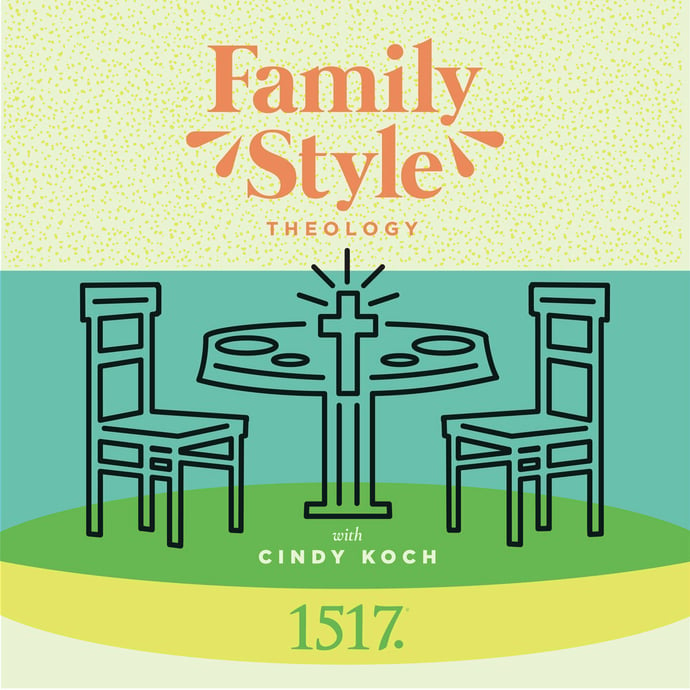Family Style Theology encourages theological conversations with children of all ages. In this series, Daughter, teenage girls from ages 13-22 gather to discuss our greater story found in the Bible. Based on the story of the Gospel of Jesus Christ, our discussion wonders what a baptized child of God looks like. Exploring the Word of God in Romans 3-6, we compare our sight to what we hear from God.
Podcasts
Each 1517 Podcast is dedicated to delivering Christ-centered content through weekly, monthly, and seasonal audio platforms. Listen online or on your favorite podcasting app.
Author
- All Authors
- Aaron Zimmerman
- Adam Francisco
- Amy Mantravadi
- Blake Flattley
- Bob Hiller
- Bradley Gray
- Brian W. Thomas
- Bror Erickson
- Bruce Hillman
- Caleb Keith
- Chad Bird
- Chris Rosebrough
- Christopher Gillespie
- Cindy Koch
- Craig Donofrio
- Dan van Voorhis
- Daniel Deen
- Daniel Emery Price
- Darrin Sheek
- David Andersen
- David Rufner
- David Zahl
- Debi Winrich
- Delwyn Campbell
- Donavon Riley
- Doug Klembara
- Edward Killian
- Elyse Fitzpatrick
- Erick Sorensen
- Flame
- Grant Klembara
- Gretchen Ronnevik
- Haroldo Camacho
- Jacob Smith
- Jared C. Wilson
- Jeff Mallinson
- Jeffrey Pulse
- Jessica Thompson
- Jim Nestingen
- Joel Fitzpatrick
- Joel Hess
- John Andrew Schreiner
- John Bombaro
- John T. Pless
- John W. Hoyum
- John Warwick Montgomery
- Katie Koplin
- Kelsi Klembara
- Ken Sundet Jones
- Magnus Persson
- Matt Popovits
- Michael Berg
- Michael Horton
- Nick Lannon
- Paul Koch
- Peter Nafzger
- Philip Bartelt
- Raleigh Sadler
- RJ Grunewald
- Robert Kolb
- Rod Rosenbladt
- Ron Hodel
- Sam Leanza Ortiz
- Sarah Condon
- Sarah Crowder
- Scott Davis
- Scott Keith
- Steven Paulson
- Tanner Olson
- Troy Neujahr
- Uwe Siemon-Netto
- Wade Johnston
- William Cwirla
-
Family Style Theology encourages theological conversations with children of all ages. In this series, Daughter, teenage girls from ages 13-22 gather to discuss our greater story found in the Word of God. Together we contemplate the stories of prominent women from our history, Sarah and Mary from the Bible. We talk openly about trusting God’s promises in the midst of hard situations.
-
Family Style Theology encourages theological conversations with children of all ages. In this series, Daughter, teenage girls from ages 13-22 gather to discuss our greater story found in the Bible. Our conversation is about Revelation 21 and 22, comparing the Garden of Eden to the New Earth. Not only do we talk about our restored creation, we discuss how that reality changes our story right now.
-
Family Style Theology encourages theological conversations with children of all ages. In this series, Daughter, teenage girls from ages 13-22 gather to discuss our greater story found in the Bible. Our conversation is about Revelation 21 and 22, comparing the Garden of Eden to the New Earth. Not only do we talk about our restored creation, we discuss how that reality changes our story right now.
-
Join the conversation with Cindy Koch and her children in this six-part series involving select FAIRY TALES. On this episode we recall the adventures of Pinocchio, while discussing total depravity, consequences for sin, and a gracious Savior. We were inspired by an essay by J.R.R. Tolkien called “On Fairy Stories”. Ultimately, these fun stories stir up simple truths about ourselves, our God, and the greatest story we know in the Gospel of Jesus Christ.
-
Join the conversation with Cindy Koch and her children in this six-part series involving select FAIRY TALES. On this episode we talk about The Little Mermaid and the connection between sacrifice, true love, and Christ's blessed exchange with us. We were inspired by an essay by J.R.R. Tolkien called “On Fairy Stories”. Ultimately, these fun stories stir up simple truths about ourselves, our God, and the greatest story we know in the Gospel of Jesus Christ.
-
Family Style Theology encourages theological conversations with children of all ages. In this series, Daughter, teenage girls from ages 13-22 gather to discuss our greater story found in the Word of God. Together we talk about knowing the truth about ourselves and discovering God’s truth in the Bible according to His story in Genesis 1, Psalm 139, and John 1.
-
I'm stepping - I'm stepping in it! What does it smell like? In this episode, Gillespie and Riley discuss Menno Simon's writing on faith, why prepositions matter, and the practical consequences of Gospel-law sermons.
-
Just Follow The Step by Step Instructions. This week, Gillespie and Riley dig into a sermon by William Seymour, who was a key figure in the Asuza Street Revival outpouring. In particular, they zero in on baptism, the means of the Spirit, and why Christian preaching is a matter of death and new life.
-
One sermon, two men, maximum effort! In this episode, Gillespie and Riley jump back into Whitefield's sermon, "The Folly and Danger of Being Not Righteous Enough." This week, they turn a more critical eye on Whitefield's sermon, discussing revivalism, sermonizing, and the purpose of the church.
-
One sermon, maximum effort! This week, Gillespie and Riley discuss a sermon by George Whitefield, who defends his theology against the attacks of an “old light.”
-
We're not going to walk this one off. Riley and Gillespie continue their theological adventure through Robert Capon's "The Astonished Heart." This week, they examine the corporate model of the church, then get transparent critiquing themselves in relation to the church as an institution.


